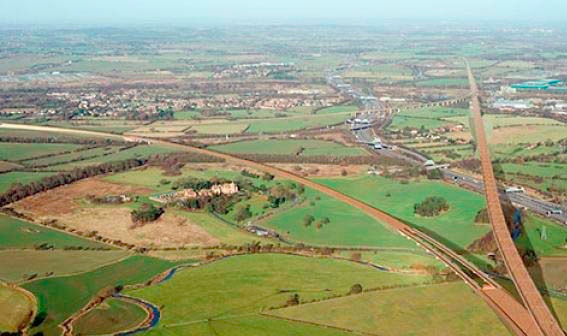
The CLA responded to the HS2 route consultation covering the Phase Two tracks from Birmingham to Manchester and Leeds saying the increasing land grab is unacceptable.
The organisation warned that landowners have lost up to three times the land they were initially prepared to lose to the high speed rail scheme.
Consultation on Phase Two of the HS2 high-speed rail project has failed to consider the fundamental question of whether farming businesses will be sustainable through the disruption and uncertainty caused by its construction, the NFU said today.
After the NFU submitted its evidence to the latest part of the consultation over the project, NFU Head of Policy, Dr Andrew Clark, said big question marks still remained about the cost-effectiveness of the project and the benefits it would bring.
“Farmers and growers recognise the importance of investing in the nation’s infrastructure to ensure cost effective communication and transfer of goods and services.
“However, public investments should offer a positive return and the NFU still questions the value of the HS2 proposal. Coupled with the significant disruption and damage caused to over 200 farm businesses along the HS2 Phase Two route, we found no more support for this proposal than we did when the route for Phase One was being consulted on.
“We are especially worried that there has been a distinct lack of engagement with farmers and landowners who will be directly affected by the proposed route. HS2 must carry out far more one to one meetings to gain information about the likely impact before any final decision can be made on the route. Not consulting with key landowners and farmers who will be affected, because their land will be compulsorily acquired, is a serious oversight.
“The Appraisal of Sustainability (AOS) process has only been carried out at a superficial level and fails to address the fundamental issue of sustaining a farming business through the disruption and uncertainty caused by the construction of Phase Two. By only focusing on the highest quality agricultural land, the AOS has completely failed to consider the value of other farmland to a whole farm business and its day to day operations, or the implications for food production, and whether an agricultural holding will still be viable once land has been taken.
“We know from our experience under Phase One that it is only since the publication of the Environmental Statement consultation that landowners and farmers have actually become aware of exactly how much land is likely to be taken from their holdings.
“While the impact on important habitat sites will be mitigated to ensure that there is no net loss of biodiversity, no mention is made of the fact that even more valuable farm land will have to be taken out of production to achieve this. We understand that the bunding and embankments that will be created will also take out additional large areas from agricultural production.
“It is vital that no more land than is absolutely necessary is taken away from farmers to construct this line and that the loss of the best and most versatile agricultural land is kept to an absolute minimum.”
CLA President Henry Robinson said: “HS2 has so far taken huge amounts of land for environmental mitigation, contractors sites, and electricity substations and also has the power to take land for development.
“Now there is talk of using the route for electricity and water distribution which will require even more room.
“Landowners up and down the route have three main concerns - that HS2 will take too much land, pay too little compensation and bring years of uncertainty that will damage their homes, businesses and farms.
“If HS2 goes ahead it should only take land required to satisfy its legal obligations to construct a railway”
The CLA’s response to the consultation argues that the scheme should have a duty to only take the minimum land required to construct a railway.
Mr Robinson said: “We want a Property Bond Scheme put in place to address blight, a duty of care with an enforceable code of practice and better compensation provisions with accompanying mitigation.”
CLA Chief Surveyor Andrew Shirley said “The compulsory purchase legislation used to deliver schemes like HS2 is outdated and unsuited to dealing properly and fairly with the commercial businesses and livelihoods affected due to the sheer scale of the HS2 infrastructure.
“There will be little certainty on the final land take for at least three years, and then construction will take more than a decade to complete. Businesses and individuals are suffering and will continue to do so for the next two decades”
